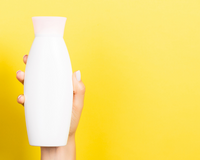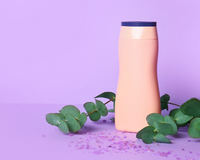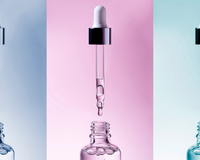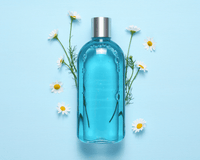How many ways have been invented to damage hair - heat styling, dyeing, chemical exposure, but much more recipes for hair repair masks? And this allows you to look to the future of hair with optimism.
Hair Restoration Masks Made From Natural Ingredients
What girl has never made a hair mask from natural ingredients at least once in her life? These recipes pass down from generation to generation and, of course, vary from case to case. But if we had arranged a buffet table of popular hair masks, then there would be products discussed below.
Mustard Or Something Spicy
People often use mustard as a natural detergent. You can dilute it in warm water, mustard powder, horseradish, or even use hot pepper traditionally to accelerate hair growth and revitalize hair follicles. As conceived, this is exactly what should happen when the scalp "bakes" from sharp components.
But sometimes, it can burn. To avoid an unpredictable individual reaction, we recommend that you consult with a trichologist or dermatologist in advance - the same applies to the use of all other components for masks, which will be discussed later.
Egg Yolk
Egg yolk is a moisturizing, nourishing, and glossy ingredient on its own. Besides, it is often added to "hold together" other products in the hair repair mask and achieve a viscous consistency, as well as slightly offset the spice of components like mustard. Everything is like cooking! For the preparation of masks, it is a recommendation to separate the yolk from the protein. Then the hair will shine better.
Oils In Regenerating Hair Masks
And, of course, what a regenerating hair mask without oils. More oils, good and different - nutritious olive, sunflower, almond oil, lighter apricot kernel oil, burdock oil for hair growth, and castor oil, strengthen not only eyelashes but also curls.
Sea buckthorn oil helps to "seal" the hair's ends and prevent splitting, coconut oil - to give a laminating effect, and tea tree oil - to normalize the water-lipid balance. For regenerating hair masks, not only individual oils are used, but also their mixtures. But be careful not to end up in a situation where the oils cannot be rinsed out later.
Hair Mask That Restores Hair After Coloring
Plus, oils can wash out the color if your hair is dyed. However, this does not apply to the formulations of professional hair repair products for colored hair - when their formula is enriched with oils. It has a design that prevents the color from washing out.
The oils in ready-made restorative hair masks do not weigh down the strands but only restore and nourish. For example, the Tigi Bed Head Color Goddess Professional Mask includes Shea Butter and Almond Oil to help maintain the brightness of colored hair while restoring it.
Kefir And Firming Hair Masks Made From Dairy Products
If you have gone too far with natural oils and cannot wash them off, kefir will come to the rescue. And by itself, kefir or sour cream softens and moisturizes the hair, envelops it with an invisible film, and gives it shine. Not many people like the smell of fermented milk products that remain on the hair. It is recommended to apply a few drops of orange oil to the hair against it. Here is such a cycle of butter and "milk" in nature!
Lactic Acid Regenerating Hair Mask
Lactic acid, which is found in fermented milk products, is often included in restoring hair masks. An example of this is in the TIGI Bed Head Dumb Blonde balm-mask for blondes. Everyone knows how difficult it is to restore bleached hair. Still, the unique formula of this product over time helps to give the strands shine and reduce brittleness. It provides the necessary nutrition and hydration.
Glycerin in Hair Restoration Masks
Glycerin is a frequent "guest" in masks for hair restoration. This is because it cannot only moisturize but do it for a long time and retain moisture inside the hair. Therefore, you can often find glycerin in DIY-recipes for hair repair masks. Besides, this component can be purchased at the pharmacy, and it is cheap.
You can find glycerin in the Dove Intensive Recovery mask, plus Keratin Repair technology, which helps restore hair from damage. This is a classic refreshing hair mask that, with regular use, allows you to reduce hair breakage, fill it with moisture and nutrients from the inside.
Herbal Teas
Many years ago, women poured boiling water over nettles, chamomile, or other useful plants, insisted for several hours, strained and rinsed their hair with the prepared broth. Or they used herbal tea as one of the components to create natural regenerating hair masks.
You can do this too, even if no herbs grow under your windows - pour boiling water over the dry pharmacy collection, and you finish. Herbal teas also soften hair, add shine, control the scalp's oiliness, and act as natural antiseptics.
Mask For Hair Restoration On Herbal Tea
The Chistaya Liniya brand is perhaps one of the few that develop hair repair products not on the water but herbal decoctions. For example, the "Shine of Color" Phyto-mask based on healing herbal broth, with clover extract, vitamins, and polysaccharides, helps restore hair after dyeing and prolong its brightness the color as long as possible.
How To Use Restoring Hair Masks
Step 1. When preparing to strengthen hair masks from what is in the refrigerator, it is better not to apply them with your hands. It will be easiest to spread the consistency of the viscous gruel with a toothbrush, and if you often make natural masks, you should consider purchasing a special hairdressing brush.
Step 2. Before using any of the masks prepared by yourself, do an allergy test: apply a drop of the composition, for example, on the bend of the elbow, and wait a couple of hours. Apply the mask briefly at first, especially if it contains sharp ingredients or oils. At first, 10-15 minutes will be enough, and in subsequent times, if everything goes well, you can increase the time to 40 minutes. We do not recommend leaving the masks overnight.
Step 3. You can apply masks for hair restoration once a week, more often if the hair has severe damage. Please note that if you prepare the hair repair mask yourself, you must use it immediately. Such funds are not stored for a long time. Fortifying hair masks, especially oil-based, are preferable to apply to hair before washing and then rinse with shampoo.
Step 4. Keeping a natural regenerating mask on your hair to not stain everything around, wrap your head on top with cling film or put on a plastic shower cap. On top, build a beautiful turban from a towel on your hair, and mysterious, like Scheherazade, wait for the result. For additional heat exposure, you can still warm up the mask with a hot hairdryer through polyethylene.
Step 5. A common mistake when using natural or commercial masks is to forget about the hair repair conditioner. After applying the mask, you need a conditioner to close the cuticle scales and smooth the hair. If you want to go all the way using natural ingredients, try rinsing your hair with water acidified with vinegar or lemon juice (lemon juice, only if the hair is not dark). This gives a nice conditioning effect and makes the strands shine!









